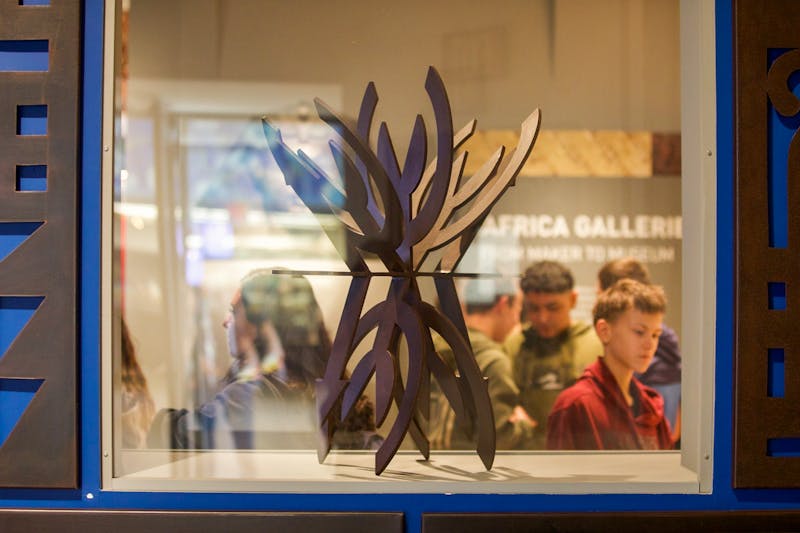
To illustrate a common type of microaggression, I will present a scenario that most Asian-American Penn students have probably faced at some point in their lives.
You encounter a stranger at a social function, be it an after-party, networking event, or even in the line to get free food. You shake hands, introduce yourselves, checking off all of the formalities involved with meeting someone new. Then, they ask you the seemingly innocuous but dreaded-by-all-Asian-Americans question:
“So... where are you from?”
At this point, I would explain that I am from the Northern Virginia/DC area, and bounce the question back to the other person. But more often than not, there is a pause and brief flash of dissatisfaction that flashes across the other person’s face. I attempt to take this with grace, and after some more small talk, we part ways. The situation is not ideal for either party — I’m left feeling a bit jarred that the automatic assumption is that I am not from this country, and the other person usually walks away without learning my ethnicity.
Alpha Kappa Delta Phi (aKDPhi), an Asian American-interest sorority at Penn, recently ran a campaign called “It’s 2018, Penn.” It was an initiative to raise awareness of microaggressions — the subtleties in speech and behavior that marginalize minorities and/or people of color, much like in the scenario depicted above. The campaign came at a good time, as it brought to light that microaggressions are a real problem not just at Penn, but in educational institutions and workplaces all over the United States.
For me, Korean heritage is a part of my life that I treasure. I speak Korean at home, my entire extended family resides in South Korea, and Korean food is my go-to cuisine. Despite that, having spent the vast majority of my life in the metropolitan DC area, this will always be the place I call home. For many Asian-American students at Penn, English is our primary language, and the United States is the only place we know. Visiting Asian countries is just as much of a “tourist experience” for us as it would be for anyone else.
So how does one ask a person of Asian heritage where they are from? Many people seem to misunderstand that inquiring about an Asian-American’s ethnicity and asking about the place they come from or call their hometown are two entirely different questions. Most Asian-Americans will be more than happy to answer either, so long as the manner in which the question is asked does not insinuate that the person of Asian heritage is somehow not from the United States.
So there are countless alternative and more sensible ways to ask about an Asian-American’s heritage than by asking “where are you from?” — the answer to which may not necessarily be an Asian city or region. I want to establish a few ground rules on how one might go about this task and avoid any potential incidents of microaggression.
First and foremost, one might be better off not asking at all. If the person who appears to be of Asian heritage has never disclosed their ancestry or mentioned any experience outside of the United States, their Asian ancestry might not be an important part of their life. It would be inappropriate to further press the subject when it is clear that ‘Asian’ is not an identity that that person associates with.
Otherwise, it might help to make an educated guess. East Asian surnames are rather distinct, so one could use the power of deduction to narrow down the possibilities. For example, if a person’s last name is “Nguyen,” it would not be completely unreasonable to ask if they are Vietnamese-American. However, it would be inadvisable to follow up with questions such as “Are your parents from country X?” or “What is so-and-so like in YOUR country?” These questions contain the flagrant assumption that the Asian-American experience is somehow different from the “typical" American’s. In fact, many first, second, and third generation Asian-Americans have spent their entire lives in the United States and have often had upbringings very similar to those of white Americans.
Finally, it is important to initiate conversation with your new Asian-American friend without resorting to making generalized cultural references. I have found that many people try to connect with me by saying a variation of “By the way, I love kimchi!” Yes, kimchi is wonderful and quite Korean — in fact, it is Korea’s national dish — but it is also a food that is enjoyed by millions of other people in the world. I have never tried to relate to a Caucasian person by saying that I enjoy eating hamburgers; so, naturally, I expect the same return of courtesy.
Physical appearance can be mutually exclusive from the nationality one identifies as. While I am very proud of my Korean heritage, I identify with being American just as much as I do with being Korean, if not more. As a rule of thumb, one should always avoid saying things they wouldn’t otherwise say to a white person. It’s always those good-natured comments like “I voted for Obama” or “I love Chinese food” that end up being deceptively hurtful.

JENNIFER LEE is a College sophomore from Fairfax, Va. studying economics. Her email is leej@dailypennsylvanian.com.
The Daily Pennsylvanian is an independent, student-run newspaper. Please consider making a donation to support the coverage that shapes the University. Your generosity ensures a future of strong journalism at Penn.
Donate






